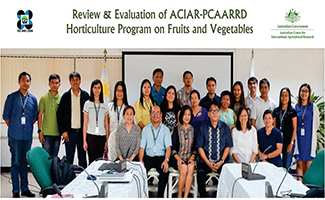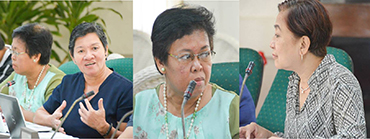 The horticulture program on fruits and vegetables of the Australian Centre for International Agricultural Research (ACIAR) and the Philippine Council of Agriculture, Aquatic and Natural Resources Research and Development of the Department of Science and Technology (DOST-PCAARRD) was recently reviewed at the Council’s complex. The review was conducted to determine the project’s consistency with its target and objectives and its directions and constraints, if any.
The horticulture program on fruits and vegetables of the Australian Centre for International Agricultural Research (ACIAR) and the Philippine Council of Agriculture, Aquatic and Natural Resources Research and Development of the Department of Science and Technology (DOST-PCAARRD) was recently reviewed at the Council’s complex. The review was conducted to determine the project’s consistency with its target and objectives and its directions and constraints, if any.
DOST-PCAARRD Acting Executive Director Dr. Reynaldo V. Ebora emphasized the importance of the review of research and development projects, which are related to agriculture and aquatic resources regardless of the source of funding.
The project, Integrated disease management strategies for the productive, profitable and sustainable production of high quality papaya fruit in the southern Philippines and Australia, was presented by Valeriana P. Justo, project leader from the University of the Philippines Los Baños (UPLB). One of the key findings of the project is identifying Erwinia mallotivora as the causal organism of bacterial crown rot in the Philippines.
Meanwhile, Dr. Zenaida C. Gonzaga, project leader from the Visayas State University (VSU), presented the accomplishments of the project, Integrated crop management to enhance vegetable profitability and food security in Southern Philippines and Australia. One of the findings under the project is the attainment of higher yield in vegetables with the use of soil amendments. It also shows grafting to be one of the potential solutions to the bacterial wilt problem in sweet pepper. The low tunnel and house-type protective structures were also found to be effective in growing off-season vegetables.

Fourteen partners from UPLB, USM, VSU, University of Southeastern Philippines (USeP), and UP Mindanao participated in the review. Among those who served as members of the Technical Review and Evaluation Panel (TREP) were Dr. Teresita U. Dalisay of the Crop Protection Center of UPLB (CPC-UPLB), DOST-PCAARRD Acting Executive Director Dr. Reynaldo V. Ebora, Socio-Economics Research Division (SERD) Officer-in-Charge Dr. Ernesto O. Brown, Crops Research Division (CRD) Director Dr. Jocelyn E. Eusebio, and DOST-PCAARRD staff Leilani D. Pelegrina, Allan B. Siano, Gretchen O. Nas, and Meliza A. Festejo.
